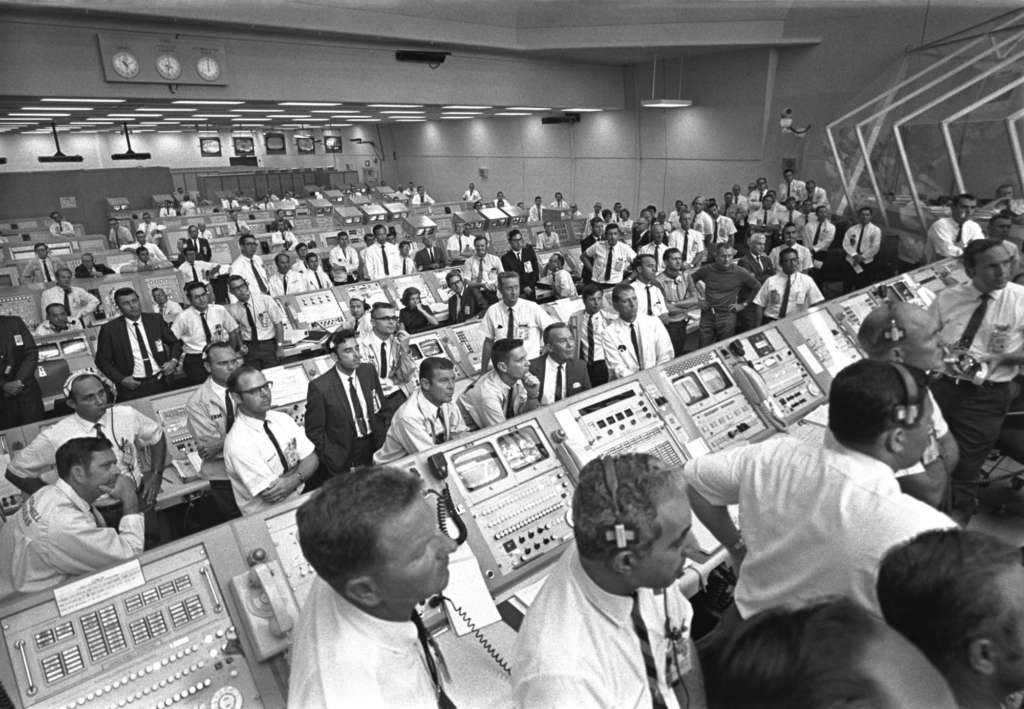
Our grand choice: The moon
The U.S. didn't choose to merely try for the moon.

When John F. Kennedy famously spoke under a blistering sun at Rice University in Houston, Texas, he noted the first transatlantic air crossing had occurred only 35 years earlier. Then he stated one of the justifications of the seemingly outrageous goal of landing a man, within the decade, on the moon: “Because that goal will serve to organize and measure the best of our energies and skills; because that challenge is one we’re willing to accept; one we are unwilling to postpone; and one we intend to win …”
Kennedy didn’t say, we choose to try and get to the moon. He said we choose to go to the moon.
I listen to that speech from time to time, delivered with such passion and polish in that classic Boston accent. In the same vein, I occasionally reread Lincoln’s Second Inaugural Address, with both its call for “just and lasting peace” and its understated piercing of the peculiar institution: “It may seem strange that any men should dare to ask a just God’s assistance in wringing their bread from the sweat of other men’s faces, but let us judge not, that we be not judged.”
Both show what presidential leadership is capable of inspiring.
Lincoln, who was fascinated by telegraph technology, could scarcely have imagined the America of the early space race. In the time between his and Kennedy’s speeches, the last Civil War veteran was laid to rest, nations fought two world wars and the second of which finally ended by the detonation of the product of another all-out national effort.
On that summer Sunday in 1969, my family rushed home from a trip to New Hampshire. People had some idea of what it might look like when a man — two men, in fact — actually set foot on the moon. In my grade school days, it was customary to roll black-and-white TV sets into classrooms so we could see what people called the blastoff. The glare of the rocket would wreck havoc with the settings on the primitive receptors in those video cameras. Then the rocket would shrink to a white dot as it arced away from Earth. We’d seen the grainy images of the first space walk in 1965.
By 1969 my family had acquired a color TV — a 23-inch Motorola console, to be exact, won in a Gulf Oil Company sweepstakes. It was a bulky thing, requiring my dad and I to regularly shove it away from the wall and remove the Masonite back. We’d pull the tubes and take them to the local drug store, which had a tube tester in the back. Home technology otherwise consisted of an Alliance Tenna-Rotor strapped to the chimney and a couple of Princess extension phones.
But on that Sunday evening, the Motorola worked perfectly. And the moon landing went perfectly, so far as the half-billion people witnessing it on Earth knew. We’d seen NASA disasters, notably the 1967 fire that killed three astronauts during a test of the Apollo command module. In truth, the march to the moon was a journey marked by setbacks, errors, investigations, budget arguments, and even carefully harbored doubts on the part of astronauts themselves.
Now we know how touch-and-go that final descent to the moon really was, with error messages generated by the on-board computer scaring the ground control staff.
Nevertheless, to my mind the moon landing stands as humankind’s greatest achievement. It jump started nascent industries and sparked new ones. It genuinely “organized,” to use JFK’s word, the best in people and their institutions, and without the aim of mass destruction and death but rather in service of exploration and knowledge.
True, it was partly a Cold War effort that merited the front page of Pravda. America had been knocked out of space somnambulance by Sputnik. My remembered impression was that, yes the U.S. had decisively beaten the Soviet Union to the moon, but the average person saw it as a societal or systemic win, not a military one. I think fair minded people even today can admire the technological and cultural talents of the Russian people while lamenting the series of terrible political and economic systems under which they’ve labored.
Few people realized how the learnings of the moon pursuit would blossom into world-changing technologies. For example, within 20 years of the moon landing you could buy a powerful computer at a mall kiosk.
More Tom Temin Commentary

JEDI cloud project: Clean but still tainted?
These days of the lunar landing remembrance, we’re graced with a full moon view. What one sees gazing at the moon changed on July 20, 1969. No less wondrous and mysterious, the moon is yet somehow altered in having been touched by mortals. Just as mortals were altered by having touched the moon.
When my own kids were young, we got a dog, a greyhound. My favorite activity was walking him and his successor on a warm evening. On one early walk, I noticed how close Mars was, clear and discernibly reddish. “Wow,” I thought, “Mars really is red!” I couldn’t share this revelation with the greyhound. Moses was too busy sniffing every blade of grass to notice anything in the sky. A dog’s brain doesn’t possess the power to produce awe at the sight of the heavens, even if you point his nose to it in a dark field on a clear night.
But for mankind, which made a giant leap a half century ago, two things remain wondrous: The celestial orbs and the human capacity to choose greatness.
Copyright © 2025 Federal News Network. All rights reserved. This website is not intended for users located within the European Economic Area.
Tom Temin is host of the Federal Drive and has been providing insight on federal technology and management issues for more than 30 years.
Follow @tteminWFED





